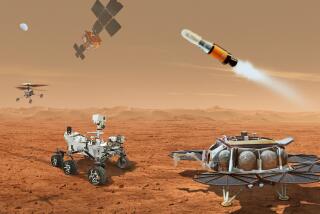Apathy Spells Trouble for the Super Collider, Scientists Told
- Share via
DENVER — Plans to build the world’s largest atom smasher are in serious trouble because of “apathy” in Congress, Energy Secretary John S. Herrington and a leading Republican congressional supporter of the project told a major symposium here Thursday.
“The project is in jeopardy,” Herrington warned several hundred scientists attending the conference, sponsored by the American Physical Society.
Herrington’s grim assessment was seconded later in the day by Sen. Peter V. Domenici (R-N.M.), a member of the Senate’s Committee on Energy and Natural Resources, who has been a strong supporter of the proposed superconducting super collider.
“I can’t leave you with a great deal of hope,” Domenici told the conference via a satellite hookup from Washington.
He also told the assembled scientists that the massive project has little chance of getting funding in the next year or so.
“I don’t see $500 million or $600 million next year” to get the project started, Domenici said in a speech that left many of the physicists stunned.
His and Herrington’s comments came on the first day of the conference, which has brought together many of the top names in physics, including several Nobel laureates.
Their pessimism contrasted sharply with the view of former presidential science adviser George Keyworth, who insisted that the project is virtually in the bag because, he predicted, Congress will not turn its back on “one of the few truly positive things that will be on the congressional agenda over the next year and a half.”
Interestingly, the differences between an advance text of Herrington’s speech and his actual remarks suggested that he only recently has reassessed the project’s chances in Congress.
Support in House
In his prepared comments, Herrington noted that “there are over 260 co-sponsors of a bill for authorization (of the project) in the House of Representatives, and sponsors are being solicited for a similar initiative in the Senate.”
But he changed his tune substantially in his actual speech, pleading with the scientists to do everything they could to drum up political support for the super collider.
“We have not yet established in Congress that this project is a national priority, and it should be,” said Herrington, whose agency would build the accelerator, which would be at least 10 times more powerful than the largest atom smasher in the world today.
In a brief press conference after his talk, Herrington said the project is clearly “in danger of not being funded.”
Asked what he based that assessment on, Herrington said: “Apathy. I see apathy in Congress.”
The federal deficit also makes it far more difficult to win support, he said.
The accelerator would hurl subatomic particles in opposite directions through an underground, 53-mile circular tunnel. Traveling at near the speed of light, the particles would collide at enormous energies, and the debris from those collisions should tell scientists much about the nature of the most fundamental building blocks of matter.
Twenty-five states are competing for the project, and that broad-based interest has engendered considerable political support for the collider up to now.
Yet there is concern here that when the list of possible sites is narrowed down to a handful next month, the losers would be less likely to support the project, further eroding its political backing.
“The broad support may dwindle” when some states learn the facility will not be built within their borders, Domenici noted.
A final site is to be picked from the finalists in about a year.
More to Read
Sign up for Essential California
The most important California stories and recommendations in your inbox every morning.
You may occasionally receive promotional content from the Los Angeles Times.










